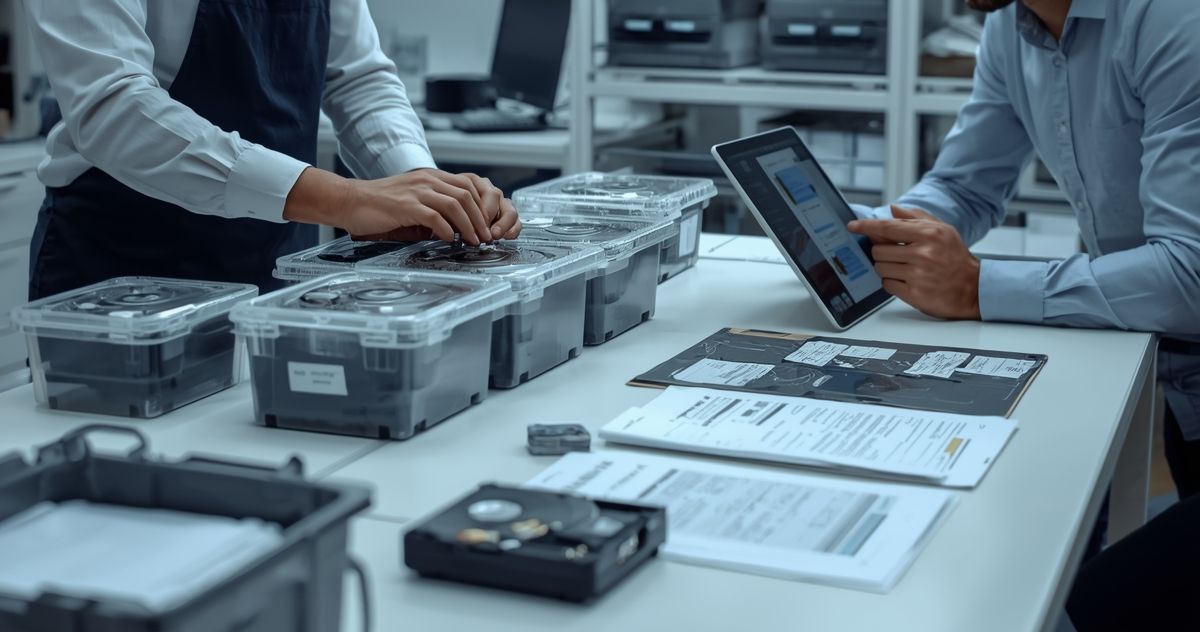Why Your Old SSD Deserves Special Care in Media Destruction
Why Your Old SSD Deserves Special Care in Media Destruction
In today's digital age, solid-state drives (SSDs) have become a staple in computer storage, offering unprecedented speed and reliability compared to traditional hard drives. Their rise in popularity is well-deserved, but with these advanced features comes a new set of challenges, especially when it comes to media destruction.
Understanding their unique properties is crucial if you're looking to securely dispose of your old SSDs. This blog post will walk you through the special considerations needed for SSD media destruction, ensuring your data remains protected.
Understanding the Basics of Solid State Drives
SSDs are fundamentally different from the older hard disk drives (HDDs) that many people are familiar with. Unlike HDDs, which use spinning disks to read and write data, SSDs use flash memory.
This means data is stored on interconnected flash memory chips, allowing for faster access and retrieval. While this offers numerous benefits, it also presents unique challenges when it comes time to destroy the data.
Flash memory chips are densely packed, meaning data retrieval can be faster, but it also means that data can remain more deeply embedded within the device. Physical destruction alone might not be enough to ensure data is completely unrecoverable. This inherent complexity is why it's crucial to pay special attention to SSDs during the destruction process.
The Risks of Inadequate SSD Destruction
Failing to properly destroy an SSD can lead to significant data breaches. Imagine confidential business information, sensitive personal data, or intellectual property falling into the wrong hands. The financial and reputational damage could be catastrophic. Therefore, understanding the risks associated with inadequate SSD destruction is vital.
Data stored on SSDs is not easily wiped with traditional methods. For instance, using a simple magnet, which might work for HDDs, will not affect an SSD. Furthermore, even deleting files or performing a standard format won't completely erase the data. SSDs require specialized procedures to ensure all data is irretrievable, emphasizing the risks if not handled correctly.
Why Traditional Methods Fall Short
Many people assume that traditional data destruction methods can be applied universally to all storage devices, but this is a misconception. Traditional methods, such as degaussing (using magnets to disrupt data) or shredding, often prove ineffective for SSDs. The science behind these methods doesn’t align with how data is stored in flash memory.
SSDs don’t have the magnetic surfaces that HDDs do, rendering degaussing useless. Similarly, shredding might physically break the device, but it doesn't guarantee that data can't be pieced back together or retrieved from the remaining chips. It's important to recognize these limitations and seek solutions specifically designed for SSDs.
Secure Erase and Beyond
There are several strategies for securely erasing data from an SSD. The most recognized method is using a "Secure Erase" command, which writes over existing data and resets the memory cells to their original state. However, relying solely on this approach isn't foolproof due to potential firmware bugs or system malfunctions.
It's often recommended to complement Secure Erase with other methods, such as encryption before erasure. Encrypting data before erasure ensures that even if some data remains recoverable, it would be indecipherable without the proper key. This dual-layer approach enhances data protection during the destruction process.
Physical Destruction Techniques for SSDs
When it comes to physical destruction, SSDs require specific techniques to ensure complete data destruction. Unlike HDDs, where the destruction of the disk platters suffices, SSDs require the complete pulverization of their flash chips. Attack the heart of the data storage, leaving no trace behind.
Crushing, shredding (with specialized equipment), or even incineration can be effective methods. However, these methods should be carried out by professionals with experience in SSD destruction. This ensures that no fragment of data can be recovered, offering peace of mind that your sensitive information is secure.
Environmental Considerations in SSD Disposal
Properly disposing of SSDs isn't just about data security; it's also about environmental responsibility. SSDs contain materials that can be harmful to the environment if not disposed of correctly. E-waste regulations vary by region, and it's important to ensure compliance with local laws.
Partnering with a certified e-waste recycler is a responsible way to ensure that your old SSDs are disposed of in an environmentally-friendly manner. This not only protects the planet but also ensures that your company remains compliant with environmental regulations, avoiding potential fines or penalties.
The Role of Professional Data Destruction Services
Given the complexity of SSD media destruction, many businesses turn to professional data destruction services. These companies specialize in securely erasing and disposing of electronic data storage devices, including SSDs. Their expertise and specialized equipment can guarantee the complete destruction of your data.
Working with a professional service offers several benefits, including certification of destruction, which is invaluable for record-keeping and compliance purposes. It also provides reassurance that all aspects of data destruction are handled competently and securely.
Developing a Comprehensive Data Destruction Policy
Whether handling SSDs or any other data storage medium, having a comprehensive data destruction policy is essential for any organization. This policy should outline the steps required for physical destruction, e-waste disposal, and record-keeping.
Implementing a robust policy ensures consistency and accountability, reducing the risk of data breaches. It serves as a guideline for employees, ensuring everyone understands the importance of secure data disposal and the procedures involved in achieving it.
Training and Awareness within Your Organization
Educating employees about the importance and methods of proper data destruction is a key component of organizational security. Regular training sessions should be conducted to ensure that all staff are aware of the latest best practices and understand the organization's policies regarding data disposal.
Awareness campaigns can also help employees recognize the signs of potential security breaches, fostering a culture of vigilance and responsibility. An informed workforce is better equipped to protect sensitive information and contribute to overall data security.
Evaluating Your Current Data Security Measures
Periodically evaluating your current data security measures can help identify areas where improvements are needed. Conducting audits of your data destruction procedures ensures that they remain effective and compliant with evolving regulations and industry standards.
These audits should assess the technical and procedural aspects of data destruction, including the efficacy of erasure methods, the integrity of record-keeping, and the adherence to environmental standards. Regular evaluations keep your organization responsive to emerging threats.
The Future of SSD Media Destruction
The technology surrounding SSDs is continuously evolving, and so are the methods for their secure destruction. Staying abreast of these changes is crucial for maintaining data security. Innovations in encryption and destruction techniques will continue to shape the future of media destruction.
Organizations must remain adaptable, updating their policies and practices in response to technological advancements. This proactive approach ensures that your data remains protected, even as the tools and methods for data destruction evolve.
Conclusion
In the world of digital storage, SSDs have become indispensable. However, their unique properties require special attention during the destruction process to ensure data security.
With a comprehensive data destruction policy in place, ongoing employee education, and regular evaluations of security measures, your organization can confidently manage the lifecycle of its data storage devices. By doing so, you not only safeguard your information but also demonstrate a commitment to environmental responsibility and compliance.
Ready to take control of your data security?
At Data Shredder Corporation in Massachusetts, we understand how crucial it is to destroy sensitive data securely and recycle e-waste. We provide top-notch hard drive data destruction, shredding, and electronics recycling services in Massachusetts, ensuring your peace of mind while benefiting the planet's health.
Your trust is our top priority, and we're dedicated to safeguarding your information with our certified, dependable solutions. Before a security breach even whispers your name, give us a call at(508) 978-1307 or fill out our contact form.











Share On: